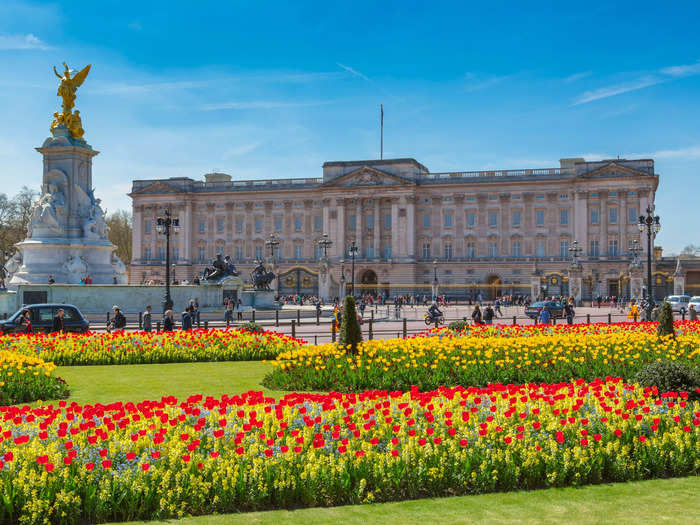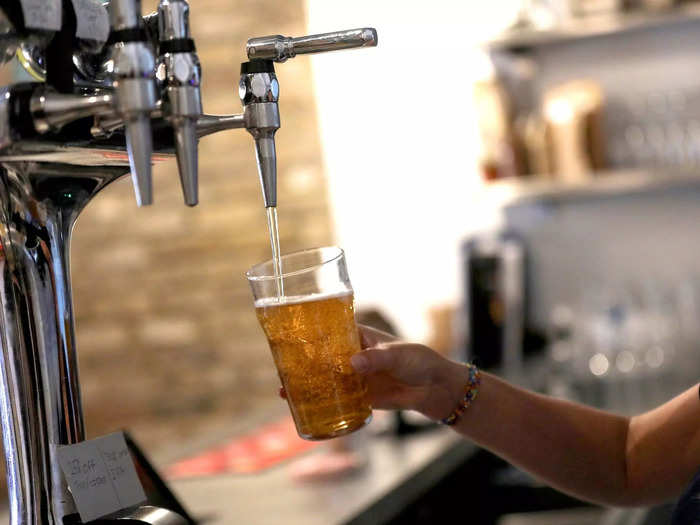I moved from the US to Scotland. My social life looks much different here.
Sophia Mitrokostas

- I moved from the US to the UK, and there have been a few surprising changes to my social life.
- Drinking in pubs is a bigger part of my day in the UK than it was in the US.
In 2017, I moved from the East Coast of the US to the UK and promptly met my Scottish husband.
Moving abroad presented many challenges, not least of which was navigating the particular foibles and intricacies of Scottish social culture.
Here are the biggest differences I've found between socializing in the US and the UK.
I've noticed that the British "stiff upper lip" is a real thing.

I feel like most people in the UK are employed in a collective national campaign against making a scene. It's become a bit of a cliché, but the stoic "stiff upper lip" that is often used to describe Brits seems to hold some truth.
When I'm emotional, I like to talk about it. My husband, on the other hand, would rather peel his own skin off with a spoon than have a conversation about his feelings.
On a similar note, many of the British people I've met while living in the UK seem to value composure and self-control over emotional candor.
To an American raised on the idea that expressing yourself is healthy and natural, this perpetual poise sometimes reads as frigid or even haughty to me.
Although keeping an unexcitable nature has its advantages — I once participated in a fire drill in the UK that verged on serene — it sometimes makes me feel like I'm one misplaced exclamation point away from being labeled as excessively self-indulgent.
I spend more time around alcohol and pubs in the UK.

Almost every social gathering I've attended in Scotland has included alcohol, from reading groups to hikes.
I'm not someone who drinks regularly. In the US, I might have a glass of wine or two a month. But my alcohol consumption has definitely increased since living in the UK.
It's normal for work colleagues, friends, and family members to regularly gather at the neighborhood pub, known as the "local."
I've also found that "pub culture" in the UK is a little different than hanging out in bars in the US. For example, at a pub, friends usually rotate buying rounds for each other instead of opening up individual tabs.
I talk about the weather constantly now.

People in the UK talk about the weather more than I ever thought possible. It's a national obsession, and, to me, it's the meteorological equivalent of America's fascination with the Kardashians or avocado toast.
As an uninitiated Yankee, I foolishly thought the weather could only be good, bad, cold, or hot. Not so.
Just as some cultures have dozens of words for snow, the British seem to have an inexhaustible supply of ways to describe a rainy day.
Now, I can talk about cloud cover with real gusto. I've actually texted my husband at work for the sole purpose of telling him that it had started to drizzle. He texted back asking me to keep him informed, and he meant it.
Casually chatting about money isn't too common here.

Speaking solely from my own experience in the UK, I've found that discussing money is far less common here than it is back home.
Though money is often considered to be a touchy subject in America, my US friends are significantly more likely to mention things like salary, debt, or bills in casual conversation.
Whereas in the UK, there are actually television ads encouraging people to break the taboo around money and talk about "the M-word."
In my experience, mingling with strangers also isn't as common in the UK.

Though the British are undeniably friendly and welcoming people, I've found that talking to strangers isn't as common in the UK.
In the States, I wouldn't think twice about chatting with a cashier about my purchases or asking a stranger at a bus stop for directions. Here, I almost feel compelled to apologize before asking if a seat on the train is taken.
This aversion to shooting the breeze has its upsides. For example, I've always been terrible at making small talk with taxi drivers. Happily, where we live in Scotland, there are actually sound-proof screens installed between the driver and passengers and a button to push if you need to communicate. It's an introvert's paradise.
But as someone who works remotely, I've found that I miss the little moments of human connection that come with briefly chatting to strangers or store employees.
Social interactions are less physical.

I grew up in a Greek-American household, which meant there was a lot of Mediterranean-style kissing, hugging, cheek-pinching, and general physical closeness between friends and family.
Though I'd say Americans aren't quite as touchy-feely as Greeks, hugging a friend, sitting next to someone on a park bench, or tapping someone on the shoulder are all still within the range of normal social interactions in America.
In contrast, I've noticed that personal space is a big deal in the UK.
Standing too close to someone or going in for a hug without warning can be downright alarming. Physical touch seems to be something reserved for only the most intimate relationships, such as between children and parents or romantic partners.
A handshake or a nod is sometimes as physical as my social interactions get here.
It has taken me a little longer to make close friends in the UK.

I like meeting new people, and I generally don't shy away from trying to turn strangers into friends. But I've found that it takes a bit longer to become friendly with someone in Scotland.
If my friends and I connected with someone at a party in the US, we'd think nothing of inviting them to brunch the next day or exchanging contact info. Meanwhile, in the UK, I feel like I'd look out of place passing out my number to people I'd just met.
I wouldn't expect to talk about more sensitive topics like family or money with a British acquaintance right away, whereas more intimate subjects might be fair game with a new friend in the US.
Obviously, I can only speak to my own experience. I'm sure there are plenty of Brits out there who would invite you to their wedding within an hour of meeting you — I just haven't found them yet.
This story was originally published in July 2020 and most recently updated on September 19, 2024.
Read more:
8 things that surprised me about moving from the US to the UK
I'm an American living in the UK. Here are the 6 things I don't miss about the US.
9 annoying things Americans do when they visit the UK — and how to avoid them
Popular Right Now
Popular Keywords
Advertisement